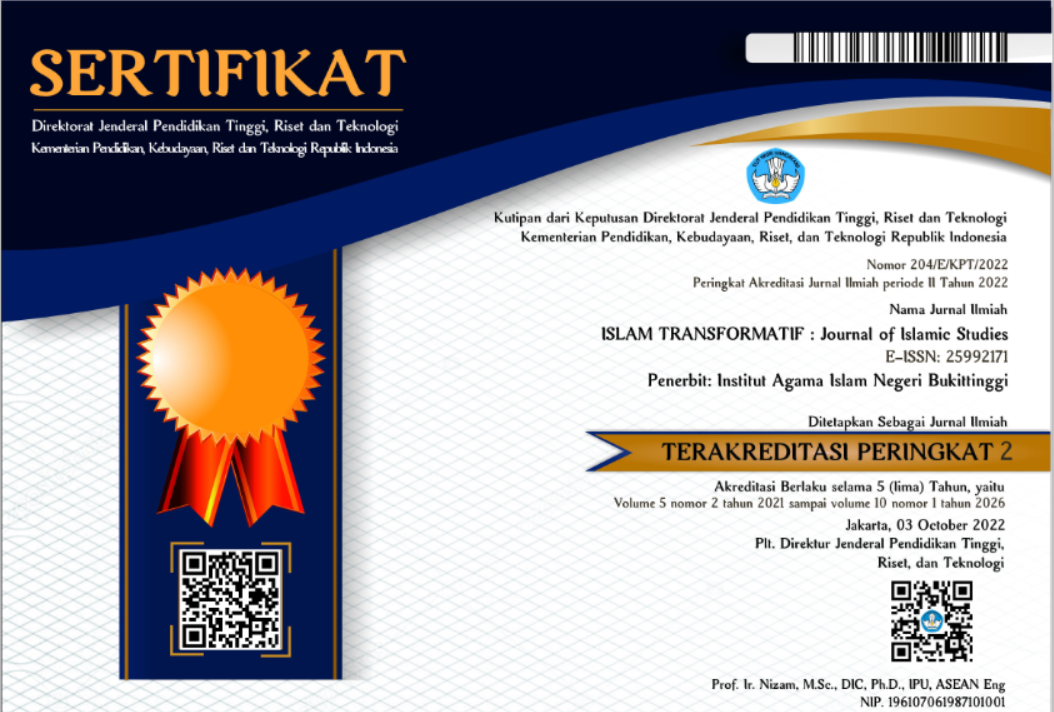HUKUM ISTRI MENCARI NAFKAH DALAM TINJAUAN MAQASHID SYARIAH
DOI:
https://doi.org/10.30983/it.v2i2.757Abstract
References
Ali bin Ahmad bin Sa`id bin Hazm, al-Muhalla, Cairo: Mathba`ah al-Nahdhah, 1347 H
Abu al-‘Ala Al-Maududi, dikutip oleh M.Quraish Shihab dalam buku, Perempuan Islam di Indonesia dalam Kajian Tekstual dan Kontekstual, Jakarta: INIS, 1993
Abu Bakar Muhammad bin Al-‘Arabi, Ahkan al-Qur’an, Cairo: Maktabah al-Baby al-Halaby, 1957 ,jilid, III,
Abu Syuqqah, Tahrir al-Mar’ah fi ‘Ashr al-Risalah, Alih bahasa Mujiono dengan judul, Jati Diri Perempuan Menurut Al-Qur’an dan Hadis, Bandung: Al-Bayan, 1996
Ali MutakinVol. 19, No. 3, (Agustus, 2017), pp. 547-570
al-Syâthibî, al-Muwâfaqât fi Ushûli al-Syarî’ah, Beirut: Dar al-Ma’rifah, 1992
Djazuli, Kaidah-Kaidah Fikih: Kaidah-Kaidah Hukum Islam dalam Menyelesaikan Masalah-Masalah yang Praktis, Jakarta: Kencana , 2006
Fakhr al-Dîn al-Râzi, 1999, al-Mahshûl fi Ilmi Ushûl al-Fiqh, Dâr al-Kutub, Juz II, Bayrut.
Fathi Daryni, 1975, al-Manâhij al-Ushûliyyah fî Ijtihâd bi al-Ra’yi fî al-Tasyrî’ . Dâr al-Kitâb al-
Ghafar Shidiq, 2009, “Teori Maqâshid al-Syarî‘ah Dalam Hukum Islamâ€, dalam Jurnal Sultan Agung, Vol XLIV No. 118 Juni-Agustus
Hans Wehr, 1980, A Dictionary of Modern Written Arabic, J. Milton Cowan (ed). Mac Donald dan
Ibnu al-Manzûr, 1972, Lisân al-‘Arab. Dâr al-Fikr, Juz II, Beirut.
Ibnu Hajar Asqalani, Fathu Bari Syarhi Syahrah al-Bukhari, Beirut: Dar al-Fikr, 1993, jilid I
Ibnu Kasir, Tafsir Ibnu Katsir, Beirut: Dar al-Fikr, 1986, jilid III
Ibnu Qayyib al Jauziyah, I’Lam al-Muwaqi’in, Beirut: Daar al-Kutub al-Ilmiyah, 1996
Innovatio,Islam Masa Kiniâ€, dalam jurnal, Vol. 6, No. 12, Edisi Juli-Desember.
Izzudin bin Abi Salam ,Qqwqid al-Ahkam fi Masalih al-Anam , Beirut ,Dar Kutub al-Ilmiyah, 1999
Jurnal Ilmu Hukum. Fakultas HukumUniversitasSyiah Kuala, Banda Aceh. 23111. ISSN: 0854-5499 │e-ISSN: 2527-8482. Kanun JurnalIlmu HukumTeoriMaqashid Al Syariah dan Hubungannya dengan MetodeIstinbath Hukum
GhafarShidiq, “Teori Maqâshid Al-Syarî’ahDalamHukum Islamâ€, dalamJurnal Sultan Agung, Vol XLIV
M. Ali Hasan, Perbandingan Madhhab. Raja Grafindo Persada, Jakarta, 2002
M. Quraish Shihab, Tafsir Al-Misbah,Jakarta: Lentera Hati, 2004,
M.Quraish Shihab, Wawasan a-Qur’an, Bandung: Mizan, 1996
Mahmud Syalthûth, 1966, Islâm: ‘Aqîdah Wa Syarî’ah. Dâr al-Qalam, Kairo.
Mohammad Darwis, “Maqâshid al-Syarî‘ah dan Pendekatan Sistem Dalam Hukum Islam ,2012
Muhammad bin Ismai`il bin al-Mughirah al-Bukhary, Shahih al-Bukhary,Cairo: Dar al-Sya`ab, 1987
Muhammad Idris al-Marbawiy, tt, Kamus Idris al-Marbawi; Arab-Melayu. al-Ma’arif,
Nasaruddin Umar, Argumen Kesetaraan Jender Perspektif Al-Quran, Jakarta: Paramadina, 1999
Satria Effendi, “Dinamika Hukum Islam†dalam Tujuh Puluh Tahun Ibrohim Hosen. Remaja , 1990
Syihab al-Dîn Ahmad ibn Idrîs al-Qarafy, Anwâr al-Burûq fî Anwa’ al-Furûq. Dâr al, 1344 H
Tahir ibn Ashur, Maqâshid al-Syarî‘ah al-Islâmiyah. Dâr al-Salam, Kairo,2009
Wahbah al-Zuhaili, Nadhriyatu al-Dharuriyah al-Syar’iyah, penerjemah Sayid
Wahbah al-Zuhaili, Ushûl al-Fiqh al-Islâmi, Dâr al-Fikri, Damaskus, 1986
Downloads
Published
How to Cite
Issue
Section
Citation Check
License
Authors who publish with this journal agree to the following terms:
- Authors retain copyright and grant the journal right of first publication with the work simultaneously licensed under a Creative Commons Attribution-ShareAlike 4.0 International License that allows others to share the work with an acknowledgment of the work's authorship and initial publication in this journal.
- Authors are able to enter into separate, additional contractual arrangements for the non-exclusive distribution of the journal's published version of the work (e.g., post it to an institutional repository or publish it in a book), with an acknowledgment of its initial publication in this journal.
- Authors are permitted and encouraged to post their work online (e.g., in institutional repositories or on their website) prior to and during the submission process, as it can lead to productive exchanges, as well as earlier and greater citation of published work (See The Effect of Open Access).




